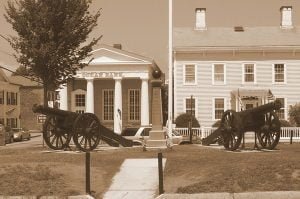Biographical Sketch of Joseph Gibson
Archibald Gibson, of Ireland, emigrated to America and settled in Virginia. He had a son named Joseph, who served in the war of 1812. Joseph married Susan Hudson, and settled in Lincoln County, Mo., in 1818. His children were Mary, Elizabeth, Archibald, Nancy, John, William, Patsy, Susan, Lucinda, and Malinda. Mr. Gibson was married the second time to the widow Caffer, whose maiden name was Matilda Wright: By her he had Rufus, Mary, Waller, Matilda, Martha, Richard, Emma, and Thomas J. Mr. Gibson died in Lincoln County in his 87th year. Archibald, Elizabeth, and John married and settled in Warren … Read more


